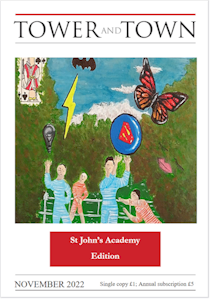

Tower and Town, November 2022 (view the full edition) (view the full edition)On Jealousy In The Literature Of LoveA speech written as part of the sixth form debate for Marlborough Literature Festival, exploring jealousy and sympathy within Shakespeare’s ‘Othello’. Jealousy within the literature of love is a trait that is rarely afforded any degree of sympathy from audiences on account of history’s codification of it as an inherently feminine trait. From the infamous betrayal of Clytemnestra in Aeschylus’ ‘Agamemnon’ to the complex sexual jealousy of Marianne in Sally Rooney’s recent bestseller, ‘Normal People’, women throughout literature, and in particular the literature of love, have been burdened with the ineffable sins of masculinity; patriarchal expectations of subordination and delicateness that have transformed them into a timeless scapegoat. Yet why is jealousy the centre of this? Why, amongst man’s systematisation of the sins of femininity, should jealousy be crowned as their epitome? The answer, I believe, is because jealousy represents an expression of female autonomy, an acknowledgement of a women’s desire to exist in an otherness that is otherwise denied her. In describing a woman as jealous, she is given motive, and above all, a potential to be fulfilled. In a world controlled by the porcelain grip of men, any violation of the established order can lead to fracture: as Clytemnestra took her jealous revenge on Agamemnon and Cassandra, and Marianne’s subtle resentment ate at her once and future lover, jealousy has, and always will be, as much a symbol of female villainy, one of feminine power. However, while jealousy is frequently used as a marker for toxic femininity, it would be both reductive and misogynistic to suggest that women, even in literature, are the only ones capable of its expression. In ‘Othello’, William Shakespeare subverts this traditional archetype in a truly fascinating way: instead of representing the women as one-dimensional villains, defined only by their want of something else, it is the male characters who fall prey to the ‘green eyed monster’ in their own respective ways. In applying the lens of the inverse, Shakespeare adds depth and complexity to his narrative, challenging the audience’s preconceived notions of the comfortably archetypal narratives of the mystery plays and classical reproductions to which they were accustomed. Furthermore, Othello’s jealousy-driven downfall deeply contradicts his initial portrayal as the perfect Renaissance Man. Through this, Shakespeare satirises the base Aristotelian principle that the tragic hero should not compromise his inherent nature. From this perspective, it is therefore arguable that the role of tragic hero too is subverted and falls instead to Desdemona. In this complex exploration of gender and morality, Shakespeare highlights the quintessential female-coding of jealousy within love literature, and therefore the assertion that is intrinsically connected with basal villainy, rendering jealous characters arguably unsympathetic. Eleanor Flower (Year 13) |